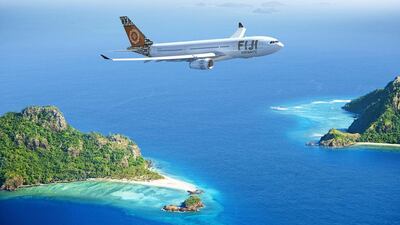It's fairly easy to travel around the world from the Middle East these days, especially with the region's major carriers making new alliances. However, there is one hidden gem that connects Australasia with the US that may not be on the tip of your tongue, yet. The announcement in April of an interline agreement between Etihad and Fiji Airways means that now, more than ever, you have a reason to stop over in the South Pacific during a longhaul business trip.
Fiji Airways’ new A330 aircraft offers an excellent business class cabin, which is light years ahead of Air Pacific’s (as it was formerly known) crumbling 747s. The new aircraft, new branding and new destinations make this airline a still relatively undiscovered carrier that should not be overlooked.
The airline offers flights from LAX, Sydney and Hong Kong to Nadi International Airport, Fiji’s main airport, and offers the opportunity to stop over in relative luxury in a variety of the 300 islands of Fiji. On boarding the new planes, you immediately notice the cool, calm interiors in muted earthy tones. Crisp white leather and traditional Fijian pattern prints adorn the cabin, and the seats, which are the same as Singapore Airlines’ regional business class seats.
With a small cabin of just 24 seats, the service is intimate, friendly and professional, and I was constantly offered hot towels, beverages and a variety of excellent tasty local dishes. The seat itself almost reclines flat, and even considering today’s standards of fully flat beds, they offer a comfortable sleep on what are mainly overnight flights with the carrier.
While the in-flight entertainment is fairly limited, it is good enough. The screens are large and the accompanying noise-cancelling headsets some of the best I have experienced in a long while. The airline has really lifted its game, and is one of the best boutique airlines around the world.
Thanks to codeshares with Cathay, Qantas, Air New Zealand, American and now a closer relationship with Etihad, the airline can be utilised on a variety of around-the-world business itineraries. Instead of the usual direct flights from Hong Kong or Sydney to LAX, why not stop off in a little bit of Pacific paradise?
What is the seat comfort like on the Fiji A330?
Surprisingly, it was excellent with great seat pitch and a large high-resolution screen. Each cocooned seat has generous personal space and storage compartments. With so few seats in the business class cabin, the overhead bins also offer plenty of space per passenger. The seat has 60” seat pitch and 21” seat width in a 2 x 2 x 2 configuration, and when reclined offers a comfortable bed, on which your feet sit underneath the seat in front.
What sort of food offering can you expect on board?
On the long-haul flights, expect a dinner followed by a breakfast before landing. The main meals offer a variety of western and Pacific dining options. I enjoyed a great ‘Surf and Turf’ with some of the best- tasting prawns I’ve ever sampled in the air.
So is the agreement between Fiji Airways and Etihad a fully-fledged codeshare?
Not completely, it’s more of a deal to cement ties between the two carriers. It allows each airline to sell seats for the other to ensure easier travel and booking connections for passengers. It also permits the sale from and to 12 cities in Europe, 17 in the Middle East, five each in Africa and North America, 29 in Asia and three in Australia – to and from Fiji.
Will the airline be offering any new routes?
Not for a while, although the award-winning carrier has just ordered new planes, meaning with a larger fleet new destinations are likely to be just around the corner. But with a variety of airline partners, there is a variety of code-shared routes and air-mile earning opportunities.
How much does it cost to fly from the UAE to Fiji?
A business class round trip from Abu Dhabi to Fiji’s Nadi International Airport will cost around Dh31,000.
business@thenational.ae
Follow us on Twitter @Ind_Insights

